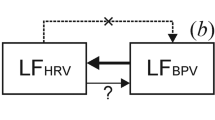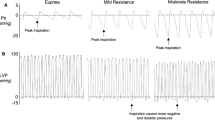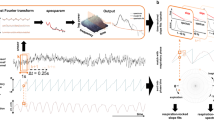Abstract
We have monitored oscillations in arterial pH (of respiratory frequency) in normal man at rest and during exercise. The pH oscillations are known to reflect respiratory oscillations in arterial carbon dioxide tension generated at the lungs. We have found that the pH oscillations increase in their upslope and downslope during exercise. This means that oscillations in arterial carbon dioxide tension can be considered as a control signal.
This is a preview of subscription content, access via your institution
Access options
Subscribe to this journal
Receive 51 print issues and online access
$199.00 per year
only $3.90 per issue
Buy this article
- Purchase on Springer Link
- Instant access to full article PDF
Prices may be subject to local taxes which are calculated during checkout
Similar content being viewed by others
References
Yamamoto, W. S. J. appl. Physiol. 15, 215–219 (1960); Biophys. J. 2, 143–157 (1962).
Band, D. M., McClelland, M., Phillips, D. L., Saunders, K. B. & Wolff, C. B. J. appl. Physiol. 45, 768–777 (1978).
Author information
Authors and Affiliations
Rights and permissions
About this article
Cite this article
Band, D., Wolff, C., Ward, J. et al. Respiratory oscillations in arterial carbon dioxide tension as a control signal in exercise. Nature 283, 84–85 (1980). https://doi.org/10.1038/283084a0
Received:
Accepted:
Issue Date:
DOI: https://doi.org/10.1038/283084a0
This article is cited by
-
An Anti-hyperventilation Instruction Decreases the Drop in End-tidal CO2 and Symptoms of Hyperventilation During Breathing at 0.1 Hz
Applied Psychophysiology and Biofeedback (2019)
-
Respiratory oscillations in alveolar oxygen tension measured in arterial blood
Scientific Reports (2017)
-
Ventilatory changes following head-up tilt and standing in healthy subjects
European Journal of Applied Physiology (2005)
-
A review of the control of breathing during exercise
European Journal of Applied Physiology and Occupational Physiology (1995)
-
Carbon dioxide transport in the body—a simple electrical analogue
Medical & Biological Engineering & Computing (1985)
Comments
By submitting a comment you agree to abide by our Terms and Community Guidelines. If you find something abusive or that does not comply with our terms or guidelines please flag it as inappropriate.



